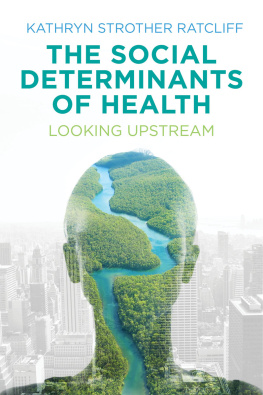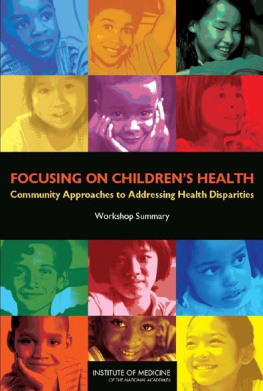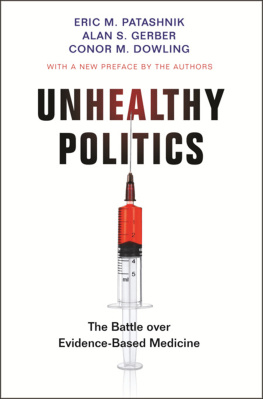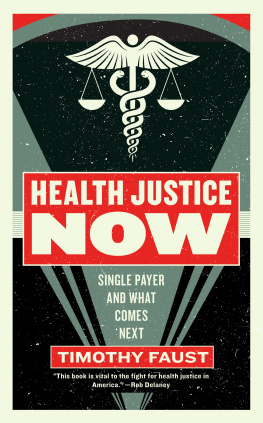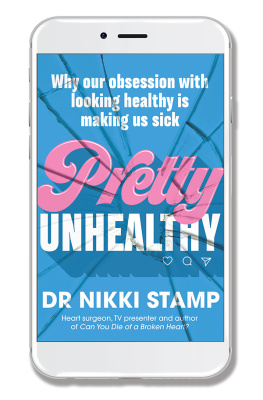Contents
Guide
Pages

The Social Determinants of Health
Looking Upstream
Kathryn Strother Ratcliff
polity
Copyright Kathryn Strother Ratcliff 2017
The right of Kathryn Strother Ratcliff to be identified as Author of this Work has been asserted in accordance with the UK Copyright, Designs and Patents Act 1988.
First published in 2017 by Polity Press
Polity Press
65 Bridge Street
Cambridge CB2 1UR, UK
Polity Press
101 Station Landing
Suite 300,
Medford, MA 02155
USA
All rights reserved. Except for the quotation of short passages for the purpose of criticism and review, no part of this publication may be reproduced, stored in a retrieval system or transmitted, in any form or by any means, electronic, mechanical, photocopying, recording or otherwise, without the prior permission of the publisher.
ISBN-13: 978-1-5095-0435-0
A catalogue record for this book is available from the British Library.
Library of Congress Cataloging-in-Publication Data
Names: Ratcliff, Kathryn Strother, 1944- author.
Title: The social determinants of health : looking upstream / Kathryn Strother Ratcliff.
Description: Cambridge, UK ; Malden, MA : Polity, [2017] | Includes bibliographical references and index.
Identifiers: LCCN 2017000625 (print) | LCCN 2017009267 (ebook) | ISBN 9781509504312 (hardback) | ISBN 9781509504329 (pbk.) | ISBN 9781509504343 (Mobi) | ISBN 9781509504350 (Epub)
Subjects: LCSH: Social medicine. | Public health.
Classification: LCC RA418 .R336 2017 (print) | LCC RA418 (ebook) | DDC 362.1--dc23
LC record available at https://lccn.loc.gov/2017000625
The publisher has used its best endeavours to ensure that the URLs for external websites referred to in this book are correct and active at the time of going to press. However, the publisher has no responsibility for the websites and can make no guarantee that a site will remain live or that the content is or will remain appropriate.
Every effort has been made to trace all copyright holders, but if any have been inadvertently overlooked the publisher will be pleased to include any necessary credits in any subsequent reprint or edition.
For further information on Polity, visit our website: www.politybooks.com
Preface
Improving the health of our world requires knowledge of the principal determinants of our health and the ways to address them effectively. Fortunately many scholars, activists, community residents, and organizations like the World Health Organization, as well as various professional organizations, people, and groups have worked hard to understand and change what has become known as the social determinants of health (SDoH).
The task of understanding the SDoH is not easy, as our social world is a complicated and ever-changing place. Our understanding of the significance and long-term impact of human activity on our health and on the environment evolves with research and experience. Furthermore, the upstream triggers that affect our health downstream through conditions of daily life such as work, water, air, food, and transportation are subject to the vagaries of politicians, policy makers, industry advocates, lobbyists, and activists. These players necessarily change as public sentiment and the political climate shifts.
I am writing this during a particularly dramatic shift in health-related influences in the United States. With new industry-friendly occupants in the White House and a Republican Party that has vowed to replace the Affordable Care Act in control of both houses of Congress, what had been a growing commitment to addressing the SDoH was dramatically turned on its head. The promise of a cleaner, greener future seems at odds with the new administrations aim to grow our economy by deregulating industry and by pursuing policies that threaten negative impacts on the SDoH. For example, in his first month in office, President Trump signed an order that would roll back a whole host of Environmental Protection Agency (EPA) regulations needed to protect the environment, including a regulation that restricted coal companies from dumping mining waste into waterways. The man he appointed director of the EPA, Scott Pruitt, has had close working ties with fossil fuel industries, worked to block President Obamas climate change agenda, and, as Attorney General of Oklahoma, sued the EPA 14 times.
While business and industry leaders applaud the new presidents assault on protective regulation, science-based agencies throughout the government, from the National Science Foundation (NSF) to the Department of Energy (DOE), have been rattled by White House requests for information on scientists engaged in climate and other environmental research; many are concerned that this is a first step to eliminating from the government anyone with these views. The National Forest Service made headlines defying orders to suspend the distribution of public information about climate change during the transition of the new administration, and scientists scheduled an unprecedented march on Washington. How will these activities factor into societys ability and desire to reduce poverty, clean up our environment, reduce emissions that contribute to climate change, provide safe and healthy jobs, and eliminate health disparities?
While the examples highlighted in this book predate the current changes, they illustrate precisely the mechanisms that have connected and continue to connect our political, economic, and social institutions to our health. Indeed, the issues remain the same, regardless of politics. As members of a society, we are all responsible for identifying the drivers of systemic public health problems and for working to correct them. Looking upstream is the first step in our collective progress. That is where this book begins. It ends optimistically, with examples of both government action and corporate social responsibility that illustrate a fundamental common ground: the importance of an environment in which we should be able not only to survive, but to thrive as a healthy, productive society.
This book is an attempt to reach out to college audiences in public health, sociology, political science, and environmental science as well as to the general public that has not yet joined the conversation but needs to, if we are to make substantial progress. By providing an accessible overview of the SDoH and some of the possible solutions, this book hopes to ignite interest and informed activism. Our communities, nations, and the world are not healthy. We cannot continue down our current path. Doing so is not sustainable.
Kathryn Strother Ratcliff
March 2017
Storrs, Connecticut
Introduction
America is a rich nation with an abundance of highly sophisticated and to-be-envied healthcare technology. It has well-trained, sophisticated healthcare providers and spends much more per person on healthcare than other nations do: it spends about $8,700 a year, while most peer countries spend less than $5,000, the average being $3,453 (OECD Health Statistics 2015). Its health expenditures arent just a little bit more; they are a lot more.
With all of this going for them, it would seem that Americans are healthier than the citizens of other countries; but they are not. Two typical health outcomes used to measure the health status of a population are telling: infant mortality and life expectancy. On these two measures, the United States does not rank highly; it is about thirtieth on both. This means that in almost thirty other countries babies are more likely to survive and people are more likely to live longer than in the United States.

